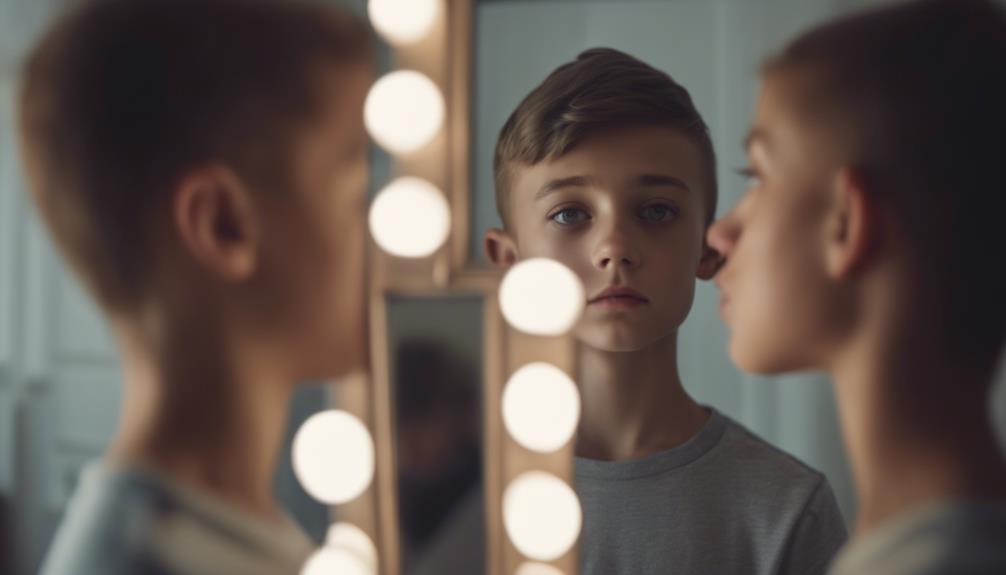Your relationships are influenced by patterns learned from your parents, impacting how you connect, communicate, and resolve conflicts. Having positive parental role models can lead to trust and respect, while negative dynamics can result in unhealthy habits. You may unknowingly be drawn to partners who resemble your parents, creating familiar relationship dynamics. However, by recognizing these patterns, you can empower yourself to break free and develop healthier connections. Understanding your early attachments and seeking therapy can help reshape your approach to relationships. Uncovering and working through these inherited behaviors can lead to personal growth and more fulfilling relationships. Interested in delving deeper into how your past influences your current relationships?
Key Takeaways
- Parental relationships influence partner selection.
- Unconscious attraction to traits resembling parents.
- Family dynamics shape relationship behaviors.
- Early bonding impacts adult relationship patterns.
- Therapy aids in recognizing and breaking negative patterns.
Family Attachment Influences on Relationships
Observing how your parents interacted with each other can heavily influence your own relationship patterns and behaviors. Family dynamics play an essential role in shaping the way you approach and maintain relationships.
Positive parental relationships can serve as a blueprint for healthier adult relationships, fostering communication, trust, and mutual respect. On the contrary, negative parental relationships may lead to repeating unhealthy patterns such as conflict avoidance or toxic communication styles.
How your parents handle conflicts can greatly impact how you navigate disagreements in your own relationships. The emotional availability of your parents also influences how you express and manage your emotions in adulthood.
Understanding these family attachment influences can provide valuable insights into the patterns and dynamics present in your adult relationships. By recognizing these influences, you can work towards breaking negative cycles and fostering healthier connections with your partner.
Unconscious Partner Selection Patterns

Understanding unconscious partner selection patterns is crucial in recognizing how your childhood experiences with parents influence your choices in relationships.
Often, individuals gravitate towards partners who exhibit traits or behaviors reminiscent of their parents, creating repetitive relationship dynamics.
Family Influence in Selection
Unconscious partner selection patterns often mirror dynamics observed in parental relationships, influencing your choice of a partner without conscious awareness. Family influence plays a significant role in shaping your preferences and behaviors when it comes to selecting a partner. The familiarity of certain relationship dynamics from childhood can subconsciously draw you towards individuals who exhibit traits similar to those of your parents.
Childhood experiences with your family, particularly with your parents, can deeply impact the way you perceive and engage in adult relationships. You might find yourself gravitating towards partners who reflect qualities or behaviors you grew up observing, even if you're not fully conscious of this pattern.
Understanding the influence your family has on your partner selection process is vital in breaking free from repetitive relationship dynamics. By recognizing and acknowledging these subconscious patterns, you can actively work towards making more conscious and healthy choices in your relationships. Remember, awareness is the first step towards positive change.
Repetitive Relationship Dynamics
Partner selection patterns often reflect dynamics observed in parental relationships, influencing your choice of a partner without conscious awareness. These repetitive relationship patterns can shape your preferences and behaviors in relationships. By unconsciously seeking partners who exhibit traits or behaviors similar to those of your parents, you may find comfort in the familiar, even if it means repeating negative dynamics. Breaking free from these relationship patterns requires self-awareness and introspection. Understanding why you are drawn to certain types of partners can help you make conscious choices in your relationships.
| Repetitive Relationship Dynamics | Impact |
|---|---|
| Unconscious partner selection patterns | Influences choices |
| Seeking familiarity in relationships | Comfort in the familiar |
| Recognizing and addressing patterns | Key to breaking the cycle |
| Therapy and self-reflection | Tools for growth |
Perpetuating Familiar Relationship Dynamics

Recreating familiar relationship dynamics may subconsciously shape your romantic choices and behaviors. As a result of observing your parents' relationship, you might unknowingly seek partners who exhibit similar traits or behaviors. The comfort found in familiarity often drives individuals to recreate dynamics from their early experiences.
This repetition of familiar patterns in adult relationships is strongly influenced by neural processing and transgenerational trauma. To break free from these ingrained patterns and create healthier relationships, it's important to engage in healing practices.
Three key steps to perpetuate familiar relationship dynamics are:
- Self-Reflection: Take time to analyze your past relationships and identify any recurring patterns that mirror those of your parents.
- Therapeutic Intervention: Consider seeking therapy to explore further into the root causes of these patterns and work on rewiring your neural pathways.
- Mindful Awareness: Stay present in your current relationships, being mindful of any tendencies to replicate unhealthy behaviors learned from your parents.
Breaking the Cycle of Unhealthy Patterns

To break free from unhealthy relationship patterns learned from your parents, it's imperative to recognize and address these ingrained behaviors head-on.
Family history plays a significant role in shaping how we approach relationships, but it doesn't have to dictate our future.
Seeking therapy or counseling can equip you with the necessary tools to unpack and confront the underlying issues rooted in your family dynamics.
By developing self-awareness and engaging in introspection, you can start unraveling the negative patterns passed down through generations.
Open communication and vulnerability with your partner are essential in disrupting these unhealthy cycles.
Impact of Early Bonding on Adulthood

The impact of early bonding experiences with parents greatly influences adult relationship patterns and dynamics. Attachment Theory, a psychological framework, explains how the quality of these early bonds shapes how individuals interact in their adult relationships.
Consider the following:
- Secure Attachments: Children who experience secure attachments with caregivers tend to develop trust, empathy, and healthy communication skills. This foundation often leads to more stable and satisfying adult relationships.
- Insecure Attachments: On the other hand, insecure attachments can result in difficulties with intimacy, trust issues, and challenges in forming deep connections with others. These individuals may struggle with expressing emotions and maintaining long-lasting relationships.
- Break the Cycle: Understanding the impact of early bonding is vital in breaking negative relationship patterns. By recognizing how your early experiences shape your adult behaviors, you can work towards creating healthier and more fulfilling relationships.
Seeking Validation From Past Experiences

Seeking validation from past experiences influences the dynamics of adult relationships and can lead individuals to replicate familiar behaviors unconsciously. Your past interactions with caregivers shape your understanding of validation and influence how you seek it in your relationships.
Whether you received affirmations and support or faced dismissiveness and neglect, these experiences can drive your choices in seeking validation from partners. Without awareness, you may find yourself unconsciously repeating patterns learned from your parents, even if they're unhealthy.
This validation-seeking behavior can create a cycle of replicating familiar dynamics that mirror those from your past. By recognizing the role of seeking validation in your relationships, you can begin to unravel the patterns inherited from your parents.
Understanding how past experiences impact your validation-seeking behaviors is an important step towards creating healthier and more fulfilling connections in adulthood.
Creating Secure Connections in Adulthood

Developing secure connections in adulthood requires fostering emotional connection and communication as foundational elements.
Building these connections with family members and loved ones can have a profound impact on the quality of your relationships.
Here are three key ways to create secure connections in adulthood:
- Respect Boundaries: Acknowledge and respect the boundaries of your family members, allowing for a sense of safety and trust to develop within the relationship.
- Communicate Openly: Practice open and honest communication with your loved ones, sharing your thoughts and feelings while also listening attentively to theirs.
- Seek Support: Don't hesitate to seek support from therapists or support groups if needed. Seeking help can provide valuable insights and tools for enhancing your relationships with family members and others.
Influence of Parents on Partner Choices

When pondering the influence of parents on your partner choices, it's crucial to reflect on how your upbringing shapes your preferences. Your parents' role modeling, the dynamics within your family, and even unconscious influences can all impact who you're drawn to in relationships.
Understanding these factors can provide valuable insights into your partner selection process and help you navigate your own relationship patterns more consciously.
Parental Role Modeling
Parents play an essential role in shaping their children's partner choices through the example they set in their own relationships. Children often mimic their parents' relationship dynamics, whether consciously or unconsciously. Positive parental relationship examples can lead to healthier adult relationship choices and behaviors, fostering strong, loving partnerships.
Conversely, negative parental relationship patterns may result in individuals repeating similar unhealthy dynamics in their own relationships, perpetuating cycles of conflict and dissatisfaction. Observing how parents handle conflicts influences how individuals navigate and resolve conflicts in their own relationships. The emotional availability and communication styles of parents have a profound impact on how individuals express emotions and interact in relationships.
Children learn about trust, respect, and intimacy from their parents, forming the foundation for their own future relationships.
Family Relationship Dynamics
The influence of family relationship dynamics on partner choices is significant and lasting. Your immediate family plays an essential role in shaping your perceptions and behaviors in relationships. Growing up in a household with positive parental relationships can set a strong foundation for healthier partner choices and successful relationships.
On the contrary, negative parental dynamics may lead you to unconsciously repeat unhealthy patterns in your own relationships. By observing how your parents handle conflicts, express emotions, and interact with each other, you internalize certain relationship behaviors that can impact your future partnerships.
The emotional availability of your parents also influences how you express and manage your emotions in relationships. Understanding these dynamics can help you become more aware of how your family background might be influencing your partner choices.
Reflecting on your family relationship dynamics can empower you to make conscious decisions in your relationships and break free from negative patterns that may have been ingrained from your upbringing.
Unconscious Parental Influences
Unwittingly, individuals often gravitate towards partners who mirror familiar traits exhibited by their parents, shaping their choices in relationships. Unconscious parental influences play a significant role in how you select a partner and navigate your romantic relationships. Here are some ways in which these influences impact your choices:
- Personality Traits: You may unknowingly seek partners who resemble your parents in certain personality traits, such as kindness, assertiveness, or empathy.
- Conflict Resolution Styles: Observing how your parents handle conflicts can influence how you approach and resolve disagreements with your partner.
- Emotional Expression: The emotional availability of your parents while growing up can shape how you express and manage emotions in your adult relationships.
Understanding these unconscious parental influences can provide valuable insights into your relationship dynamics and help you navigate them more consciously and effectively. By recognizing these patterns, you can work towards creating healthier and more fulfilling relationships.
Importance of Processing Early Attachments

Understanding the importance of processing early attachments is fundamental for unraveling the roots of our relationship patterns and behaviors. The quality of these early attachments can have a significant impact on your long-term relationships. How you connected with your caregivers as a child can shape how you form relationships as an adult.
Unresolved attachment wounds from your parents may linger and influence how you interact with others. It's essential to recognize that transgenerational wounding can perpetuate unhealthy relationship dynamics if left unaddressed.
Fortunately, therapy and self-reflection offer powerful tools to help you process these early attachments. By delving into your past experiences and emotions, you can begin to rewire neural pathways towards healthier relationship choices.
Taking the time to explore and understand your early attachments can pave the way for more fulfilling and harmonious connections in your present and future relationships. Your willingness to confront and process these attachments sets the stage for positive growth and transformation in your relational journey.
Frequently Asked Questions
How Do Our Parents Influence Our Relationships?
Your parents shape your relationships by modeling behaviors and communication styles. Positive parental dynamics foster healthier connections, while negative patterns can lead to repeating unhealthy habits. How they handle conflicts and emotions influences how you navigate your own relationships.
Do We Mimic Our Parents in Relationships?
You often unconsciously mimic your parents in relationships. Their dynamics influence your partner choices and conflict resolution styles. Understanding this can lead to growth. Breaking the cycle requires self-awareness and intentional change.
Can a Relationship Work if the Parents Don't Approve?
Your relationship can thrive even if parents disapprove. Open communication and mutual respect are key. Address concerns constructively, set boundaries, and seek counseling if needed. Success depends on your ability to support each other.
How Does Parenting Change Your Relationship?
Parenting changes your relationship by influencing communication, conflict resolution, and emotional expression. Your bond with your partner impacts your parenting style and vice versa. Challenges and successes can strengthen or strain dynamics, fostering a supportive partnership.
Conclusion
In conclusion, understanding the impact of our parents on our relationships can be eye-opening. By recognizing the patterns we've inherited, we can work towards breaking unhealthy cycles and creating secure connections in adulthood.
It's never too late to make positive changes and build healthier relationships. Remember, the past doesn't have to dictate your future. Take control, seek support if needed, and strive for growth in your relationships. Your happiness and well-being are worth the effort.









